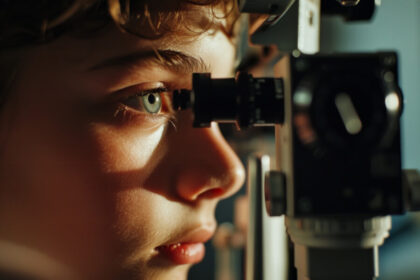Glaucoma is a group of eye conditions that can damage the optic nerve, which is vital for good vision. This damage is often caused by abnormally high pressure in the eye, known as intraocular pressure (IOP). Glaucoma can gradually lead to vision loss or blindness if left untreated, and it is one of the leading causes of irreversible blindness worldwide.
There are different types of glaucoma, but the most common is called open-angle glaucoma. In this form, the drainage angle where fluid exits the eye is open but becomes less efficient over time, leading to an increase in IOP. Other types of glaucoma, such as angle-closure glaucoma, involve a blocked or narrow drainage angle, resulting in a sudden increase in IOP and acute symptoms.
Why is early detection important?
Early detection of glaucoma is critically important for several reasons:
- Prevention of Vision Loss: Glaucoma is often referred to as the “silent thief of sight” because it typically progresses slowly and without noticeable symptoms in its early stages. By the time a person experiences vision loss or symptoms, irreversible damage may have already occurred. Detecting glaucoma early through regular eye exams allows for timely intervention to prevent or slow down vision loss.
- Preservation of Quality of Life: Vision loss due to glaucoma can significantly impact a person’s quality of life. Early detection and treatment can help maintain good vision, allowing individuals to continue performing daily activities, driving, and enjoying hobbies and independence.
- Effective Treatment: When glaucoma is detected early, treatment options such as prescription eye drops, oral medications, or laser therapy are often more effective in managing intraocular pressure (IOP) and slowing the progression of the disease. As the disease advances, it may become more challenging to control IOP and prevent vision loss.
- Reduced Healthcare Costs: Detecting and managing glaucoma at an early stage can reduce the overall healthcare costs associated with more advanced disease. Regular eye exams and early interventions are generally less costly than treating advanced glaucoma or addressing complications that can arise from untreated glaucoma.
- Personalized Care: Early detection allows eye care professionals to develop personalized treatment plans tailored to an individual’s specific type and severity of glaucoma. This ensures that the management approach is appropriate and effective for each patient.
- Education and Support: Early diagnosis provides an opportunity for individuals to learn about their condition and receive education on glaucoma management. Patients can also access support networks and resources to help them cope with the challenges of living with glaucoma.
- Monitoring Progress: Regular follow-up appointments and monitoring of glaucoma progression are essential in managing the condition. Early detection establishes a baseline for tracking changes in eye health and allows for adjustments to the treatment plan as needed.
Overall, early detection of glaucoma is crucial for preserving vision, maintaining a good quality of life, and optimizing the effectiveness of available treatment options. It underscores the importance of routine eye exams, especially for individuals at higher risk of developing glaucoma due to factors like age, family history, or specific medical conditions.
What are the early symptoms ?
In its early stages, glaucoma is often asymptomatic, meaning it typically does not produce noticeable symptoms. This is why regular eye exams are essential for early detection. However, as glaucoma progresses, individuals may begin to experience symptoms and signs of the condition. These can include gradual loss of peripheral vision, blurred Vision and halos around light.
How to early detect glaucoma?
There are a few ways to early detect glaucoma, including:
- Regular eye exams: The American Academy of Ophthalmology (AAO) recommends that everyone over the age of 40 have a comprehensive eye exam every two years. This exam will include a test of intraocular pressure (IOP), which is the pressure inside the eye. IOP is a major risk factor for glaucoma.
- Family history: If you have a family history of glaucoma, you are more likely to develop the condition. Talk to your doctor about how often you should have eye exams.
- Other eye conditions: People with other eye conditions, such as nearsightedness or diabetes, are also at increased risk of glaucoma. Talk to your doctor about how often you should have eye exams.
If you have any concerns about your vision, it is important to see an eye doctor right away. Early detection and treatment of glaucoma can help to prevent vision loss.
Conclusion
In conclusion, glaucoma is a serious eye condition that can lead to irreversible vision loss if left untreated. It is often asymptomatic in its early stages, earning it the nickname “silent thief of sight.” The key to combating this silent threat is early detection through regular eye exams.
Early detection of glaucoma is of paramount importance for several compelling reasons. Firstly, it allows for the prevention of vision loss, ensuring that individuals can maintain their sight and quality of life. Secondly, it facilitates more effective treatment options, which can slow down or manage the condition when initiated early. Additionally, early detection reduces healthcare costs associated with advanced glaucoma and offers a personalized approach to care. It empowers individuals with education, support, and a means to monitor their progress and make necessary adjustments.
To detect glaucoma early, individuals should prioritize regular eye exams, especially if they have risk factors such as a family history of the condition or other eye-related issues. Taking proactive steps and seeking prompt medical attention if any concerns arise about vision or eye health can make a significant difference in preserving one’s eyesight and overall well-being. Remember, early detection is the key to beating the silent threat of glaucoma.
FAQs
What is glaucoma, and why is it a concern?
Glaucoma is an eye condition that can lead to vision loss or blindness. It’s a concern because it often progresses without noticeable symptoms until irreversible damage has occurred.
How can I detect glaucoma early?
The best way to detect glaucoma early is through regular eye exams, including IOP measurements and optic nerve assessments. Factors like family history and other eye conditions can also increase the risk, warranting more frequent check-ups.
What are the early symptoms of glaucoma?
Glaucoma is often asymptomatic in its early stages. As it progresses, individuals may experience gradual peripheral vision loss, blurred vision, and halos around lights.
Why is early detection crucial ?
Early detection allows for timely intervention and treatment, preventing or slowing down vision loss. It also provides a more effective and personalized approach to care while reducing overall healthcare costs associated with advanced glaucoma.
How often should I have an eye exam if I have risk factors?
The frequency of eye exams varies depending on risk factors. Consult with your eye care provider for personalized recommendations. Generally, individuals over 40 and those with a family history of glaucoma should have regular comprehensive eye exams every one to two years.
What should I do if I have concerns about my vision or eye health?
If you have any concerns about your vision or eye health, it’s essential to schedule an appointment with an eye doctor promptly. Early detection and treatment can help prevent vision loss associated with glaucoma.





